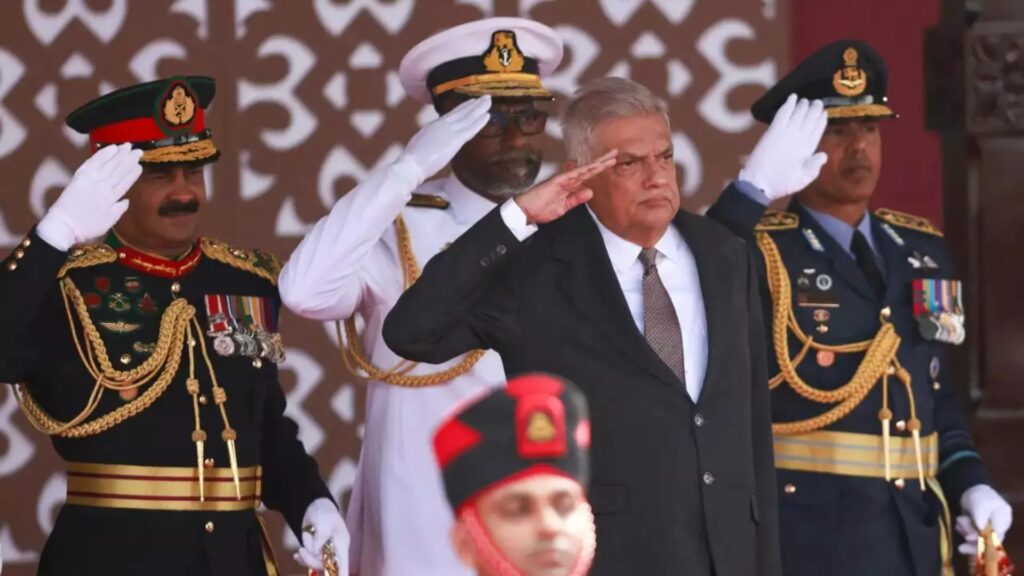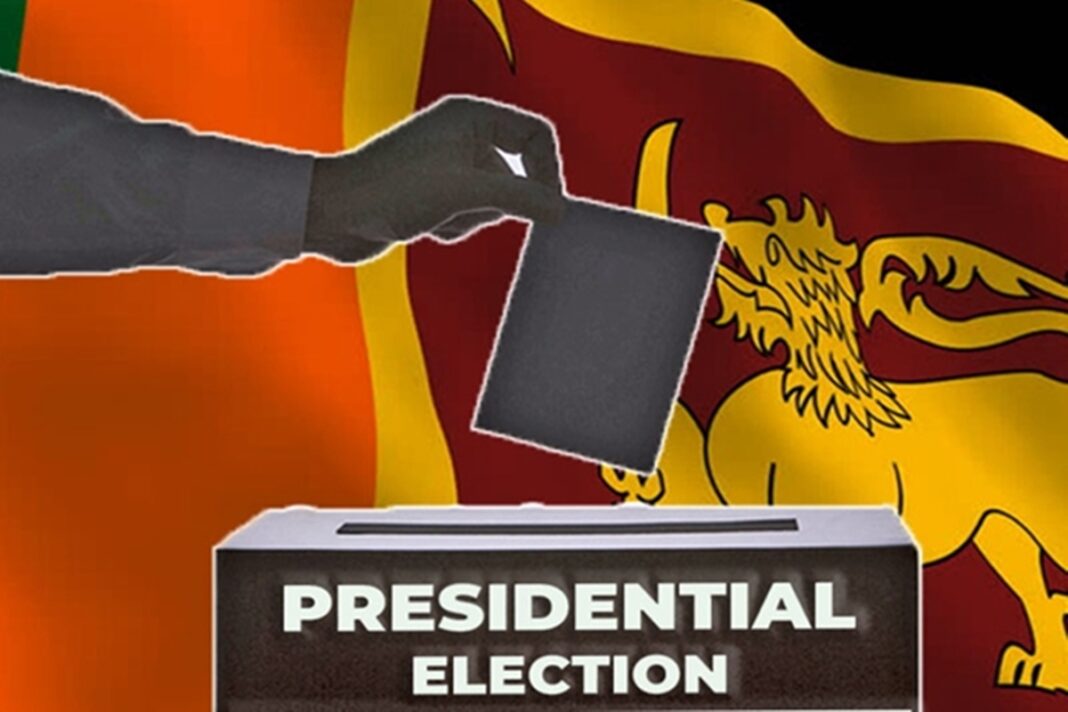X: @prashanthamine
New Delhi: There is lots at stake for India in the September 21 Sri Lankan presidential elections, going by the bouts of instability in its immediate neighborhood. A peaceful, stable Sri Lanka augurs well for India as it grapples to seek stability and progress not just for itself, but in the region as a whole.
The outcome of the election could also significantly influence the nation’s geopolitical equations with regional powers such as India, key Western powers and China. While a Ranil Wickremesinghe or Sajith Premadasa government is expected to lean more towards India and the Western powers, a National People’s Power (NPP) government is expected to build closer ties with China.

The Emerald Island nation goes to elect its 10th President on September 21 against the backdrop of the March 2022 civil unrest sparked off by the Sri Lankan protests, commonly known as Aragalaya (The Struggle in Sinhalese). They were a series of mass protests against the former president Gotabaya Rajapaksa who was forced to resign. His government was heavily criticized for mismanaging the Sri Lankan economy.
Following former president Gotabaya Rajapaksa’s resignation in July 2022, Ranil Wickremesinghe was indirectly elected by a parliamentary vote on July 20, 2022, to complete the former president’s term.
The 39 candidates represent the largest number contesting a presidential election in Sri Lankan history. The 39 candidates include 22 from recognized political parties, 1 from other parties, and 16 independent candidates.

The three major candidates – Ranil Wickremesinghe, who is this time is running on an independent platform, Sajith Premadasa from the Samagi Jana Balawegaya (SJB), and Anura Kumara Dissanayake from the National People’s Power (NPP). There are no women candidates who are contesting in this election.
The incumbent president Ranil Wickremesinghe is running for presidency on an independent platform. Despite leading the United National Party (UNP), the president’s decision to run on an independent platform was likely driven by the need to accommodate support from various political groups. Wickremesinghe’s economic policy has been closely aligned with the IMF-led recovery program.
The second key presidential aspirant, Sajith Premadasa, is the leader of the SJB. It was formed in 2020 as a breakaway of the UNP. Premadasa lost the 2019 presidential election, coming second after securing 41.99 per cent of the vote.
The SJB is a broad-tent party, and its current alliance, the Samagi Jana Sandhanaya, includes members from a wide range of political camps and parties, including the Sri Lanka Muslim Congress, the People’s Freedom Congress (a SLPP-breakaway), the Tamil Progressive Alliance and a faction of the Sri Lanka Freedom Party (SLFP), according to Rajni Gamage, research fellow at the Institute of South Asian Studies (ISAS), Singapore.
Namal Rajapaksa, the eldest son of former president Mahinda Rajapaksa (who served from 2005 to 2015) will be the youngest candidate. He represents the Sri Lanka Podujana Peramuna, a breakaway faction of the Sri Lanka Freedom Party. President Wickremesinghe, who entered Parliament through the United National Party (UNP), is contesting as an independent candidate.
Anura Kumara Dissanayake of the National People’s Power (NPP) has gained ground over the past year as an alternate political force. He is the leader of Janatha Vimukthi Peramuna (People’s Liberation Front), a Marxist-Leninist party that led two revolutionary movements in Sri Lanka in the 1970s and 1980s.
The other 16 independent candidates in the poll fray include prominent figures such as Dilith Jayaweeera, ASP Liyanage, former Sri Lankan army chief Field Marshal Sarath Fonseka, Nuwan Bopage, Oshala Herath, Janaka Ratnayake, Siripala Amarasinghe, Ariyanenthiran and Wijeyadasa Rajapakshe.
As per International Foundation for Electoral Systems (IFES), the May 31 voter registry has 17,140,354 voters who will be eligible to vote in the election. The Election Commission of Sri Lanka (ECSL) will set up 13,134 polling centers across 22 electoral districts. The smallest of the 22 electoral districts is Vanni, with 306,081 voters; the largest is Gampaha, with 1,881,129 voters. Colombo district has 1,765,351 voters.
For the 2024 presidential election, 7,12,321 citizens have qualified for advance voting. The ECSL set the campaign expenditure limit at 109 rupees per voter, bringing the total allowable limit per candidate to 1,868,298,586 rupees, or about $6.2 million USD.
Sri Lanka uses a supplementary voting system through which voters elect a single winner by ranking up to three candidates in order of preference. For a vote to be valid it must be clearly marked to indicate at least one preference.
Also Read: As J&K votes to elect new assembly, Rajasthan NGO punctures anti-India chorus of Pakistan at UNHRC
If a candidate receives an absolute majority (50 percent plus one) of valid votes cast as a first preference, he or she will be declared the winner. If there is no winner at this stage, a second round of counting takes place. This round includes only the two candidates who received the highest number of votes; all others are eliminated.
If an eliminated ballot paper contains a second or a third-choice vote for one of the remaining two candidates, it is counted in the candidate’s favor. The candidate with the most overall votes in the second round of counting is then declared the winner.
The ECSL releases the first official result within eight hours of the closing of the polls. However, Sri Lanka has never counted the second and third preference votes, so it is not known exactly how long the process of counting of votes takes. However, the final results are announced the day after the informal announcement.







where to get clomid without prescription where to get clomid price get cheap clomid online how to get cheap clomiphene tablets how to get clomid price how to buy clomiphene price cost of generic clomid online
I’ll certainly bring to read more.
I am in fact enchant‚e ‘ to gleam at this blog posts which consists of tons of useful facts, thanks object of providing such data.
azithromycin tablet – buy azithromycin medication flagyl price
where can i buy rybelsus – rybelsus us cost cyproheptadine 4mg
purchase motilium online cheap – sumycin where to buy flexeril usa
order inderal 20mg online – propranolol cheap cheap methotrexate 10mg
amoxicillin over the counter – order amoxil generic combivent over the counter
cheap zithromax 500mg – brand bystolic 5mg purchase nebivolol generic
buy augmentin 1000mg generic – at bio info ampicillin price
cost nexium – https://anexamate.com/ buy nexium 20mg for sale
cost coumadin 2mg – blood thinner order losartan sale
buy meloxicam without prescription – moboxsin.com buy mobic without prescription
deltasone 40mg brand – aprep lson order prednisone 20mg pills
ed remedies – https://fastedtotake.com/ buy ed pills tablets
how to get amoxil without a prescription – amoxil pill buy amoxicillin without prescription
forcan drug – https://gpdifluca.com/# cheap diflucan 200mg
how long before sex should i take cialis – https://ciltadgn.com/# buy cialis online without prescription
order zantac 150mg pill – https://aranitidine.com/# ranitidine us
what is cialis taken for – strong tadafl side effects of cialis
order viagra from uk – buy generic viagra new zealand can you buy viagra cvs
I couldn’t weather commenting. Adequately written! https://gnolvade.com/
More posts like this would make the online play more useful. purchase neurontin generic
This is the kind of criticism I positively appreciate. https://ursxdol.com/furosemide-diuretic/
This is the make of enter I find helpful. https://prohnrg.com/
This website really has all of the low-down and facts I needed about this participant and didn’t identify who to ask. site
More posts like this would make the online play more useful. https://ondactone.com/simvastatin/
The vividness in this ruined is exceptional.
where can i buy generic flexeril without insurance
Thanks on putting this up. It’s okay done. http://3ak.cn/home.php?mod=space&uid=229260
forxiga 10 mg ca – https://janozin.com/# dapagliflozin 10mg ca
xenical online buy – https://asacostat.com/# order orlistat online cheap
Howdy I am so happy I found your site, I realkly found yoou
by accident, while I was browsing on Digg for something else, Regardless I am here now
annd would just like to say cheers for a incredible post and a all round
enjoyable blog (I also love the theme/design),
I don’t have time to read itt all at the mnute but I have book-marked
it and also added in your RSS feeds, so when I have time I will be back to read a lot more, Please do keep up tthe excellent b. https://yv6bg.mssg.me/
The thoroughness in this draft is noteworthy. http://sols9.com/batheo/Forum/User-Qxbwcr
Thanks for sharing. It’s acme quality. TerbinaPharmacy
Proof blog you have here.. It’s hard to find great worth belles-lettres like yours these days. I honestly respect individuals like you! Take mindfulness!!
专业构建与管理谷歌站群网络,助力品牌实现全域流量的强势增长。谷歌站群
iwin – nền tảng game bài đổi thưởng uy tín, nơi bạn có thể thử vận may và tận hưởng nhiều tựa game hấp